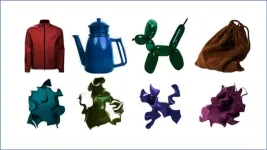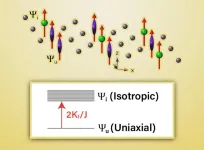(Press-News.org) Human memory is fundamental to everything we do. From remembering the faces of someone you just met to finding your cell phone that you just left on a table, one's "visual working memory"— the core cognitive system that retains visual information in an active state for a short period of time, plays a vital role. Prior work has found that visual working memory capacity is well correlated with other important cognitive abilities such as academic performance, and fluid intelligence, which includes general reasoning and problem solving, so understanding its limits is integral to understanding how human cognition works.
In the past, theories have proposed that an individual’s capacity for visual working memory is fixed but a new Dartmouth-led study finds that more visual information can be retained when stimuli are meaningful, demonstrating that visual working memory capacity is flexible. The results are published in Psychological Science.
"Our findings broadly suggest that the capacity for visual working memory may be more continuous and flexible than we thought," says lead author Yong Hoon Chung, a Ph.D. student in cognitive neuroscience and member of the Perception, Attention, and Memory Laboratory at Dartmouth.
In one of the experiments, participants were presented with images of four different colored objects on a single computer screen and instructed to remember the colors as well as possible. They were shown recognizable objects in the "meaningful" condition, and scrambled versions of the objects in the "meaningless" condition. Next, they were presented with a blank computer screen. Then, they viewed an image of one of the objects or scrambled versions of the objects in two different colors and were tasked to identify which color they just saw. Participants were never asked about the identity of the object, only the color. The task was "What color did you see?" not "Did you see a tea kettle?" Participants were then presented with hundreds of objects, as well as scrambled objects, both in random colors, and were tested on their color memory.
Through a series of five experiments, the researchers tested participants' capacity for remembering the colors of recognizable real-world objects such as that of a tea kettle versus that of an unrecognizable version of the object. The team used an algorithm developed by other researchers to convert the known object into a scrambled, abstract shape that is similar in visual complexity. The original objects and scrambled objects were then assigned random colors from a 360-degree color wheel. The idea was that earlier visual processing of the brain would be similar across both intact and scrambled objects, yet scrambled objects are unrecognizable by the observers. Thus, by scrambling the object, the meaningfulness of the stimuli is removed.
The researchers calculated how well participants were able to remember the colors of the stimuli in the meaningful versus meaningless conditions.
"Our results show that participants' memory for color was better when they had a meaningful context," says Chung. "For example, people could remember the color blue better when it was part of a blue kettle than the scrambled blue shape of a jacket."
"When colors are seen as part of something meaningful, you are more likely to remember that color," says Chung.
The other experiments in the study were similar and served as controls to test if color memory is better with recognizable objects, which proved true across the study. The controls included using upside-down stimuli instead of scrambled objects, or adding a verbal task on top of the visual task to rule out the prospect that color memory of the stimuli was due to verbalizing what was seen or adding a spatial cue at retrieval.
"Prior research has shown that space is one of the strongest cues that our visual working memory system uses, as it is kind of baked in to our visual representations, so we were also interested in examining if the effect of meaningfulness would remain when participants could use spatial locations to retrieve the colors," says senior author Viola Störmer, an assistant professor of psychological and brain sciences, and principal investigator of the Perception, Attention, and Memory Laboratory at Dartmouth. "What we found is that participants continued to remember the colors better when they were part of real-world objects and didn’t only rely on the spatial locations of where the object was seen."
"Our study demonstrates that this higher-level semantic meaning, which draws on the long-term storage of general knowledge or in this case the recognition of an object, can help make a really low-level feature that's not meaningful by itself, like color, meaningful," says Störmer. "When relatively abstract information is combined with conceptual knowledge that people already have, this can enhance one's capacity to retain this new information better."
"A lot of working memory measures are used as diagnostic tools in clinical settings to help identify deficits in memory, but they are based on the assumption that there is a fixed capacity for this type of memory," says Chung. "So, how we are testing in those fields might not necessarily be as accurate as we originally thought. It may be time to rethink the testing methodologies in order to obtain a more accurate measure of human memory," says Chung.
"Beyond the clinical setting, our findings may also have implications for how artificial intelligence systems model and manipulate human behavior, as working memory capacity is known to be related to general capacity of human cognition."
The research builds on Störmer's earlier co-authored works, which have found that the ability to remember real-world objects is stronger than remembering abstract objects.
The team plans to investigate the underlying mechanisms of visual working memory using electroencephalogram (EEG) and fMRI technologies to better understand how the brain responds to the visual context of colors.
Chung (yong.hoon.chung.gr@dartmouth.edu) and Störmer (viola.s.stoermer@dartmouth.edu) are available for comment. Timothy Brady at the University of California San Diego also served as a co-author of the study.
###
END
Real-world context increases capacity for remembering colors
New research demonstrates capacity for visual working memory of colors is flexible
2023-07-10
ELSE PRESS RELEASES FROM THIS DATE:
Argonne scientist Shirley Meng recognized for contributions to battery science
2023-07-10
The Electrochemical Society (ECS) has selected scientist Shirley Meng of the U.S. Department of Energy’s (DOE) Argonne National Laboratory as the recipient of the 2023 Battery Division Research Award for innovative research on interfacial science, which has led to improved battery technologies.
A pioneer in discovering and designing better materials for energy storage, Meng serves as chief scientist of the Argonne Collaborative Center for Energy Storage Science (ACCESS) and as a professor at the Pritzker School of Molecular ...
Researchers make a surprising discovery about the magnetic interactions in a Kagome layered topological magnet
2023-07-10
A team from Ames National Laboratory conducted an in-depth investigation of the magnetism of TbMn6Sn6, a Kagome layered topological magnet. They were surprised to find that the magnetic spin reorientation in TbMn6Sn6 occurs by generating increasing numbers of magnetically isotropic ions as the temperature increases.
Rob McQueeney, a scientist at Ames Lab and project lead, explained that TbMn6Sn6has two different magnetic ions in the material, terbium and manganese. The direction of the manganese moments controls the topological state, “But ...
Deciphering progesterone’s mechanisms of action in breast cancer
2023-07-10
“The mechanisms underlying the observed effects of progesterone on breast cancer outcomes are unclear.”
BUFFALO, NY- July 10, 2023 – A new research perspective was published in Oncotarget's Volume 14 on July 1, 2023, entitled, “Deciphering the mechanisms of action of progesterone in breast cancer.”
A practice-changing, randomized, controlled clinical study established that preoperative hydroxyprogesterone administration improves disease-free and overall survival in patients with node-positive breast cancer. In this new perspective, researchers Gaurav Chakravorty, Suhail Ahmad, Mukul S. Godbole, Sudeep Gupta, Rajendra A. Badwe, ...
More data needed on lifestyle interventions for postpartum blood pressure control
2023-07-10
Hypertensive disorders of pregnancy such as preeclampsia and gestational hypertension occur in up to 10% of pregnancies and are associated with a three-fold increased risk of chronic hypertension and up to two-fold increased risk of cardiovascular disease when compared with healthy pregnancies. While the year after pregnancy is a critical time to address hypertension risk with lifestyle changes (healthy diet and exercise), the effects of lifestyle interventions on postpartum blood pressures are not well documented.
A new Boston University Chobanian & Avedisian School of Medicine study has found that there are few relevant studies on the ...
New biodegradable plastics are compostable in your backyard
2023-07-10
We use plastics in almost every aspect of our lives. These materials are cheap to make and incredibly stable. The problem comes when we're done using something plastic — it can persist in the environment for years. Over time, plastic will break down into smaller fragments, called microplastics, that can pose significant environmental and health concerns.
The best-case solution would be to use bio-based plastics that biodegrade instead, but many of those bioplastics are not designed to degrade in backyard composting conditions. They must be processed in commercial composting facilities, which are not accessible in all regions of the ...
Canned, frozen corn industry struggling across US growing regions
2023-07-10
URBANA, Ill. — For those whose primary experience with corn is the butter-drenched cob variety, it might come as a surprise that other forms of sweet corn are in trouble. A new University of Illinois Urbana-Champaign analysis shows sweet corn production for frozen and canned products has been steadily shrinking in the U.S. over the past 27 years, particularly in rainfed portions of the Midwest.
“The processing sweet corn industry [corn grown for canned and frozen products] was thriving in the U.S. throughout the 20th century. This type of production, ...
Ethics & Human Research, July-August 2023
2023-07-10
Antiracist Structural Intervention at the Emory University Institutional Review Board
Francois Rollin, Vanessa Van Doren, Jessica Alvarez, Rebecca Rousselle, Jada Bussey-Jones
Although racial and ethnic categories are social constructs without inherent biologic or genetic meaning, race and ethnicity impact health outcomes through racism. The use of racial categories in biomedical research often misattributes the cause of health inequities to genetic and inherent biological differences rather than to racism. Improving research ...
Unhealthy beverage consumption highest among economically-vulnerable households that rely on multiple food assistance programs
2023-07-10
Philadelphia, July 10, 2023 – A long-standing and contentiously debated question is the extent to which US federal food assistance programs contribute to or deter healthy beverage intake. Findings of a new study in the Journal of Nutrition Education and Behavior, published by Elsevier, show that while beverage intake patterns rarely differed between mothers and young children who participated only in the Supplementation Nutrition Program for Women, Infants, and Children (WIC), only the Supplemental ...
Tumor monocyte content predicts immunochemotherapy outcomes for esophageal cancer
2023-07-10
JULY 10, 2023, NEW YORK – A Ludwig Cancer Research study has discovered that the presence of relatively high numbers of immune cells known as monocytes in tumors is linked to better outcomes in esophageal cancer patients treated with a combination of chemotherapy and immunotherapy, or immunochemotherapy. Esophageal cancer is the sixth leading cause of cancer mortality worldwide, and the incidence of esophageal adenocarcinoma has been climbing at a relatively swift clip over the past 40 years. Survival times for inoperable or metastatic forms of the cancer range from 6 to 12 months.
Led by Ludwig Oxford Director Xin Lu and ...
Game-playing automaton acts like an ‘irrational’ human
2023-07-10
ITHACA, N.Y. -- Humans make lots of irrational decisions in predictable ways, but what if we’re all just doing our best within the limits of our abilities?
Researchers were able to simulate human behaviors using a probabilistic finite automaton, a well-known model of limited computational power. They programmed the automatons to compete against each other in a wildlife poaching game, as either a rhino poacher or a ranger trying to stop the poaching.
When the automatons could remember everything, they settled into an optimal game strategy. But when researchers limited their memories, they took some decision-making shortcuts – the same ...
LAST 30 PRESS RELEASES:
Medicare patients get different stroke care depending on plan, analysis reveals
Polyploidy-induced senescence may drive aging, tissue repair, and cancer risk
Study shows that treating patients with lifestyle medicine may help reduce clinician burnout
Experimental and numerical framework for acoustic streaming prediction in mid-air phased arrays
Ancestral motif enables broad DNA binding by NIN, a master regulator of rhizobial symbiosis
Macrophage immune cells need constant reminders to retain memories of prior infections
Ultra-endurance running may accelerate aging and breakdown of red blood cells
Ancient mind-body practice proven to lower blood pressure in clinical trial
SwRI to create advanced Product Lifecycle Management system for the Air Force
Natural selection operates on multiple levels, comprehensive review of scientific studies shows
Developing a national research program on liquid metals for fusion
AI-powered ECG could help guide lifelong heart monitoring for patients with repaired tetralogy of fallot
Global shark bites return to average in 2025, with a smaller proportion in the United States
Millions are unaware of heart risks that don’t start in the heart
What freezing plants in blocks of ice can tell us about the future of Svalbard’s plant communities
A new vascularized tissueoid-on-a-chip model for liver regeneration and transplant rejection
Augmented reality menus may help restaurants attract more customers, improve brand perceptions
Power grids to epidemics: study shows small patterns trigger systemic failures
Computational insights into the interactions of andrographolide derivative SRJ09 with histone deacetylase for the management of beta thalassemia
A genetic brake that forms our muscles
CHEST announces first class of certified critical care advanced practice providers awarded CCAPP Designation
Jeonbuk National University researchers develop an innovative prussian-blue based electrode for effective and efficient cesium removal
Self-organization of cell-sized chiral rotating actin rings driven by a chiral myosin
Report: US history polarizes generations, but has potential to unite
Tiny bubbles, big breakthrough: Cracking cancer’s “fortress”
A biological material that becomes stronger when wet could replace plastics
Glacial feast: Seals caught closer to glaciers had fuller stomachs
Get the picture? High-tech, low-cost lens focuses on global consumer markets
Antimicrobial resistance in foodborne bacteria remains a public health concern in Europe
Safer batteries for storing energy at massive scale
[Press-News.org] Real-world context increases capacity for remembering colorsNew research demonstrates capacity for visual working memory of colors is flexible






